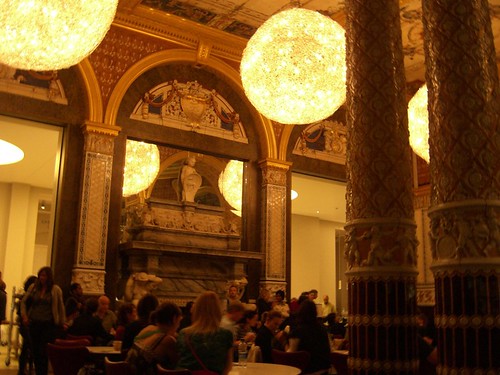Process Work In London and Mt. Tom
 Meeting the dreambody on a hike in Easthampton and at a conference at the University of London.
Meeting the dreambody on a hike in Easthampton and at a conference at the University of London.
 I’m hiking with my buddies Mollie and Keely on Mt. Tom, urban almost-wilderness in Easthampton MA. Keely is having a hard time; she says she’s upset and anxious today, that hiking is difficult and maybe we should just go without her. She struggles on the trail and walks slowly, so we put her at the head of our line to set the pace. Starting almost to cry, slowing down, dropping her head, and she’s at the point of a panic attack, she says.
I’m hiking with my buddies Mollie and Keely on Mt. Tom, urban almost-wilderness in Easthampton MA. Keely is having a hard time; she says she’s upset and anxious today, that hiking is difficult and maybe we should just go without her. She struggles on the trail and walks slowly, so we put her at the head of our line to set the pace. Starting almost to cry, slowing down, dropping her head, and she’s at the point of a panic attack, she says.
“Keely’s emotions” or “Keely’s anxiety” or “Keely’s feeling” are ways we think about this kind of situation. What can we do to help her? What does she need? How might we be contributing to her problem? Which are all good questions to ask, and is what Mollie and I were asking Keely and asking ourselves on the trail. The problem was that after talking for a while, nothing was seeming to help.
Listening to Keely talk about being afraid and panicky, and seeing her so slowed down and burdened by her fear, I decided to use some of my skills developed from studying Process-Oriented Psychology, or process work. More on process work theory in a moment, but in the forest it seemed to me that Keely’s distress in a sense wasn’t really hers. That is, the three of us were intertwined, our little hiking trip as a whole was affected by what she was going through, and maybe the three of us were more part of a single experience than seeing emotions as “hers” would suggest.
Keely felt to me like she was on the receiving end of an oppressive force. Her description fit someone under some kind of attack, victimized by an absent aggressor only she could feel. What if the way out of her state was to meet this aggressor directly? And if the obstacle to this wasn’t something inside her, but in the unwillingness of the people around her to also meet this aggressor?
The awareness of this possibility, which makes sense from a theoretical point of view in Process Work psychology, came to me as an intuition or felt body sense of the situation. It was as if Keely’s oppressed state was the visible expression of something between the three of us, and the absent aggressor was an invisible part that I could feel.
So following this intuitive impulse, I picked up a large stick and started smashing it against a tree. Over and over again, swinging big thick tree branches as hard as I could and slamming them into pieces. Each time there was a loud satisfying crash, and the shattered pieces of branch flew twenty, thirty, forty feet or more into the forest, and we cheered. Keely and Mollie were having a lot more fun than trying to talk Keely out of her state. I had brought the missing aggressor force into expression between us.
(Note to readers sensitive to earth spirits: I asked permission of the woods and trees before I started smashing things around.)
Keely’s mood changed immediately. She came out of her panic attack and continued with us up the mountain, feeling much much better. Something shifted when her own oppressed, frightened feelings encountered an aggressor, attacking force. It was as if the three of us were sharing an experience of panic that remained stuck until we also shared a completing experience of attack. When those two things could meet each other, we moved through it and had a great day.
What’s interesting about this is that Keely herself didn’t herself have to express any intense emotion, like punching pillows or smashing sticks. It was instead the shared experience between us that needed something to complete itself and move forward. Mollie, or even a stranger, maybe could have played the aggressive role that Keely’s collapsed and panicked state was somehow needing.
 Process work, an awareness practice and psychological system developed by Arnold Mindell out of Jungian and Gestalt ideas, describes this whole experience in terms of fields and dreaming. Between and through people exists a shared, unified field with its own meaning and purpose, which dreams our experiences into being and seeks awareness to move and grow. The field expresses itself like a realm of potential, a single process or energy that is moving towards unfolding itself, gets stuck, and needs awareness to find its missing parts to move forward. Up on the mountain that day we needed to have an encounter with the aggressor side, and Keely’s mood, and my tree branch smashing, allowed that to happen. When it did, energy that felt stuck began to move more freely.
Process work, an awareness practice and psychological system developed by Arnold Mindell out of Jungian and Gestalt ideas, describes this whole experience in terms of fields and dreaming. Between and through people exists a shared, unified field with its own meaning and purpose, which dreams our experiences into being and seeks awareness to move and grow. The field expresses itself like a realm of potential, a single process or energy that is moving towards unfolding itself, gets stuck, and needs awareness to find its missing parts to move forward. Up on the mountain that day we needed to have an encounter with the aggressor side, and Keely’s mood, and my tree branch smashing, allowed that to happen. When it did, energy that felt stuck began to move more freely.
What the hell are you talking about Will?
Well the language is tricky. In my mind it feels clear, but that doesn’t really mean much if I can’t communicate it well. Part of my learning in the coming years is going to be about how to express ‘spiritual’ truths in meaningful and useful ways, to convey useful practical tools to engage with mystical realities.
“The world is alive, a vast intelligent being we can communicate and interact with.” That’s my inspiring friend Seven from Portland on Madness Radio talking about the connection between mysticism and so-called psychosis. It’s an experience that runs through the wild extreme states of consciousness many of us go through, whether we’re labeled schizo, bipolar, or whatever the doctors came up with. ‘Psychosis’ for us was waking up inside the dream. Contacting reality as a living being. Peering into a mirror on the outside of what is inside us. And it felt like a tremendously important revelation about the deepest truth.
Coming out of these states, we often repudiate any possibility there was some truth there. Psychiatry teaches us that these were delusions, misinterpretations of reality, symptoms of a broken brain, and dangerous unless we resist them. For some of us that works: we come back to ‘normal’ reality and get on with fitting in. Others, it seems like a rare few, embrace the mystical side of their experience and find a balance with living in ordinary reality. And many of us try to fit in to normal reality by pushing away the mystical, it feels too risky and caught up in crisis and dysfunction to treat as real — and then we find we can’t push it away. Living in material reality, focusing on our wellness and functioning, getting a normal life — we try to do this, but it’s like the spiritual truths we encountered in our madness are demanding we take them seriously, and they’re not going to let us survive until we do. We’re caught between believing in our madness and falling apart, or not believing in our madness and falling apart. Or so it seems.
 Which brings me to process work in London, at an international conference where I was invited to speak on a panel on extreme states. Joining me were 6 professionals — psychiatrists from Ireland and Poland and clinicians from Japan, Croatia, England, and the US. Our work is varied – from locked inpatient settings to a school for kids with learning disability labels to a support group for people living in a homeless shelter to my work with Icarus and Freedom Center. My talk focused on group organizing with labeled people and the crucial importance of not re-creating exclusion — they way I work hard to bring people on meds and not on meds together, and stand against any system that would interpret people or define them rather than allowing them to define and determine who they are for themselves.
Which brings me to process work in London, at an international conference where I was invited to speak on a panel on extreme states. Joining me were 6 professionals — psychiatrists from Ireland and Poland and clinicians from Japan, Croatia, England, and the US. Our work is varied – from locked inpatient settings to a school for kids with learning disability labels to a support group for people living in a homeless shelter to my work with Icarus and Freedom Center. My talk focused on group organizing with labeled people and the crucial importance of not re-creating exclusion — they way I work hard to bring people on meds and not on meds together, and stand against any system that would interpret people or define them rather than allowing them to define and determine who they are for themselves.
What we all shared in our presentations was a curiosity about the deep mystery of states of madness or emotional distress and a deep appreciation for the unique and unknown nature of the individual. Maybe what seems ‘negative’ has something positive to offer, and we won’t find out if we don’t explore. Process work is committed to a phenomenological approach, which means you leave your interpretations aside and stick to what is immediately observable, both in your own mind and in whatever is happening for the other. Discovering and following states means trusting there is meaning somewhere, that all ‘symptoms’ have a purpose. Icarus members are often guided to spiritual and creative passions by our dysfunction and crisis; withdrawal and isolation may be understandable ways to cope with trauma, voices might be about communicating with spirits, paranoia might be sensitivity to political realities.
 To this exploration process work brings psychodrama and role playing, bodywork, meditation techniques, and a whole range of tools, all used at different times depending on how the person or situations’ dreaming process appears. Voices might mean role playing different characters; body sensations might lead to movement and dance; preoccupation with others might lead to conflict resolution methods. Each kind of work relies, like shamanism, on altered states of consciousness. Meditative awareness on the problem or disturbing experience slips us out of our ordinary way of being and into non-ordinary realms. (That’s a photo of Arnold Mindell at the conference.)
To this exploration process work brings psychodrama and role playing, bodywork, meditation techniques, and a whole range of tools, all used at different times depending on how the person or situations’ dreaming process appears. Voices might mean role playing different characters; body sensations might lead to movement and dance; preoccupation with others might lead to conflict resolution methods. Each kind of work relies, like shamanism, on altered states of consciousness. Meditative awareness on the problem or disturbing experience slips us out of our ordinary way of being and into non-ordinary realms. (That’s a photo of Arnold Mindell at the conference.)
For my talk I described some of my earliest experiences with process work in Portland, almost a decade ago. I went to see Amy Mindell, Arnold Mindells’ colleague and wife, as a client, suffering from strong suicidal feelings and an overpowering sense of despair. Other clinicians might have interviewed me for the signs of mental illness and risk factors, ready to take me to a hospital – or call the police if I didn’t want to go. Amy didn’t do that. Instead, she said, “Let’s try dying.”
The invitation was startling. She was saying that the experience I was calling ‘suicidal feelings’ might have something unexpected in it, if I approached it with curiosity and openness and was willing to explore it further. So we role-played me dying in her office, and I lay down on the floor and imagined myself dead. At first I was very frightened and upset to be doing this, but then it put me in a very powerful altered state of consciousness. I felt a deep relaxation, and a sense not of indifference to life, but of very complete acceptance. Everything felt like it was out of my control, and it was therefore OK.
Inside my suicidality was a spiritual experience of acceptance and letting go. Pushing the experience away, by pathologizing and labeling it, medicating it, or even using holistic health, meant I didn’t discover the gift within it.
That moment with Amy helped sustain me and move me forward in my life. At my darkest moments I don’t necessarily remember my session with her, but I do often reach a point of letting go into a death-like altered state where a new sense of acceptance emerges. In fact it seems sometimes that when I go into my ‘depression’ states, I need to actually go even deeper into them to get to this point. If I’m willing to die, then life’s problems must be pretty insignificant. Many spiritual traditions teach some variation on this: that death is an ally, that if we die to each moment and let go of what we think we want, we can awaken more powerfully to what is actually happening. I learned this lesson not by reading it, listening to a lecture, or meditating, but from exploring the inside of my own suicidal feelings.
My panel talk at the conference was a resounding success, with many people approaching me with words of support. It was wonderful hanging around with unusual and intriguing conference goers from as far as New Zealand and Japan, as was scheming possible collaborations in London, Croatia, and elsewhere. Talks and workshops were awesome — 28 events were offered by 51 presenters from 16 different countries. Check out the program here.
 Some topics: Organizational Change and Conflict in Bolivia; A Process Work Map of the Cold War; Coma Work, Altered States, and Illness; Shamanic Healing In Brazil; Reaching New Highs: Working with Heroin Addicts: Process-Oriented Yoga; Ethics in Palliative Care; Killing Others in the Name of God; Perspectives on Rank and Power; Post-War Reconciliation in Bolivia, and more. And the venue — the University of London — was showing a very meaningful film for me, KES. (If you haven’t seen it…).
Some topics: Organizational Change and Conflict in Bolivia; A Process Work Map of the Cold War; Coma Work, Altered States, and Illness; Shamanic Healing In Brazil; Reaching New Highs: Working with Heroin Addicts: Process-Oriented Yoga; Ethics in Palliative Care; Killing Others in the Name of God; Perspectives on Rank and Power; Post-War Reconciliation in Bolivia, and more. And the venue — the University of London — was showing a very meaningful film for me, KES. (If you haven’t seen it…).

Which didn’t leave much time for anything else, but I did manage to hang out with some of the local radical activist crowd at the squat where I was staying across from the British Museum, take a Mr. Toad’s Wild Ride across London by bicycle, listen to live music at the Victoria and Albert Museum, browse the London Review of Books shop, get lost in the tube, eat Pakistani food, talk with Max about nearly being shipwrecked, mysteriously  injure my toe, learn about cooking with coconut oil from Eliza, sleep at every opportunity I got, and visit the old apartment in Ashley Gardens, near Buckingham Palace, where my family lived in 1976 (!).
injure my toe, learn about cooking with coconut oil from Eliza, sleep at every opportunity I got, and visit the old apartment in Ashley Gardens, near Buckingham Palace, where my family lived in 1976 (!).
I can’t emphasize too strongly how much we have to learn from the movement in England and Europe. Meeting psychiatrists and former psych patients and activists and writers and advocates really helps me to not feel like an unreasonable radical or an impractical dreamer in my work. Connecting with the process work community means feeling like it’s been worth it all these years to hold on to the truth I know lies at the heart of my madness.
 The values that we stand for as a psych survivor movement are simple: stop using force on people, be honest about what mental illness is and what the risks of drugs and other treatments are, and provide people with real choices and options for how to heal, including not taking medication, and to be open to the mystery of these experiences, that they can even be positive. That’s a vision that is blasphemy for many in the US and banned from much of the media here, but it is slowly growing and making headway, and across the Atlantic there is already much more openness to it. I’m always urging people to read this document from the British Psychological Society – it shows how our vision of the future is already starting to arrive today.
The values that we stand for as a psych survivor movement are simple: stop using force on people, be honest about what mental illness is and what the risks of drugs and other treatments are, and provide people with real choices and options for how to heal, including not taking medication, and to be open to the mystery of these experiences, that they can even be positive. That’s a vision that is blasphemy for many in the US and banned from much of the media here, but it is slowly growing and making headway, and across the Atlantic there is already much more openness to it. I’m always urging people to read this document from the British Psychological Society – it shows how our vision of the future is already starting to arrive today.
You can learn more about Process Work in the Articles section of the Icarus site, or better yet, just notice something happening right now at the edge of your awareness that you’d otherwise push away, and let yourself feel into it and see where it leads you…






























 Creative Commons 2.5 copyright
Creative Commons 2.5 copyright